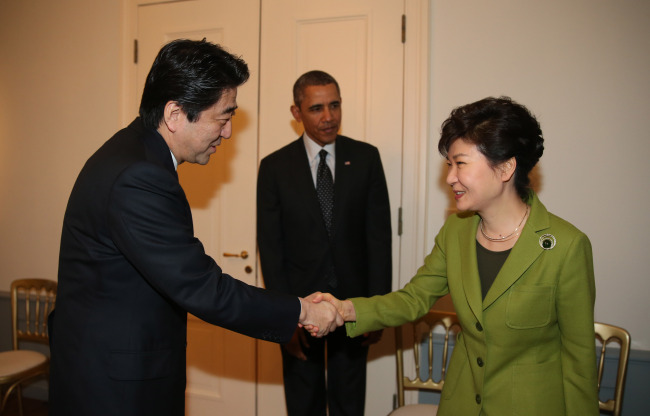
The leaders of South Korea, the United States and Japan agreed Tuesday to convene their chief negotiators on the North Korean nuclear issue as they held rare three-way talks amid American efforts to mend ties between Seoul and Tokyo.
The meeting marked the first formal talks between South Korean President Park Geun-hye and Japanese Prime Minister Shinzo Abe since they took office more than a year ago, possibly signaling a thaw in strained relations between Seoul and Tokyo.
The meeting took place in The Hague as Park, Abe and U.S. President Barack Obama attended the Nuclear Security Summit, a biennial gathering that brought together leaders from 53 countries and four international organizations to discuss ways to prevent nuclear terrorism.
Park later flew to Berlin for a state visit.

All three leaders stressed the importance of trilateral unity in dealing with North Korea.
"The North Korean nuclear issue poses a grave threat to regional peace and stability and I think it is very important for the international community, including South Korea, the United States and Japan, to fashion a united response," President Park Geun-hye said at the start of the talks.
Obama agreed on the need to continue close coordination among the three regional powers, saying that it has succeeded in "changing the game" with North Korea and sent a strong signal to Pyongyang that its provocations and threats will be met with a unified response.
Abe said it is "extremely important" to continue close cooperation on the issue to get North Korea to take a positive stance on nuclear and missile issues as well as humanitarian concerns, such as the families separated between the two Koreas.
In a friendly gesture, the Japanese leader offered greetings to Park in the Korean language.
During the talks, the three leaders agreed to urge North Korea to give up all of its nuclear programs in a complete, verifiable and irreversible manner. They also shared an understanding that Chinese cooperation is key to persuading Pyongyang, according to the South's presidential office.
They also shared the view that the six-party talks on the North's nuclear program should reopen not for the sake of talks, but when the conditions are right to make substantial progress.
They further agreed to hold a meeting of the chief nuclear negotiators of the three countries in the near future.
Frayed relations between Seoul and Tokyo have been a cause for concern for the United States as Washington seeks to develop three-way security cooperation in an effort to keep a rising China in check. The U.S. has pressured Seoul and Tokyo to come to terms with each other.
Park has shunned a summit with Abe as Japan kept angering South Korea with a series of nationalistic steps and remarks denounced as attempts to glorify its militaristic past and whitewash its wartime atrocities, including its sexual enslavement of Korean women when Korea was a colony of Japan from 1910-45.
Relations between Seoul and Tokyo had been bad even before Park and Abe became leaders. Their meeting in the Dutch city marked the first summit between the two countries in nearly two years, an unusually long break that shows how badly ties have been strained.
Tuesday's meeting was set up after Abe promised earlier this month to honor Japan's two previous apologies for the colonial rule -- known as the "Kono Statement" and the "Murayama Statement." Park welcomed the pledge, saying she hopes it will lead to better ties between the two countries.
It was unclear whether Tuesday's meeting would lead to full reconciliation.
In an interview with the German newspaper Frankfurter Allgemeine, Park said it was good for Abe to promise to uphold the apology statements, but Japan should do more to demonstrate its sincerity, including resolving the sexual slavery issue.
"I think that what is important now is sincerity," Park said in the interview published Tuesday ahead of her state visit to Germany. "The Japanese government should take sincere measures to rebuild mutual trust."
Park also said that she proposed making a joint history textbook among Northeast Asian nations to overcome history rows, just as Germany and other nations did after World War II, but the proposal has since made no progress.
She also urged Japan to learn from Germany and make greater efforts to reconcile with its neighbors. (Yonhap)




![[Herald Interview] 'Amid aging population, Korea to invite more young professionals from overseas'](http://res.heraldm.com/phpwas/restmb_idxmake.php?idx=644&simg=/content/image/2024/04/24/20240424050844_0.jpg&u=20240424200058)












![[KH Explains] Korean shipbuilding stocks rally: Real growth or bubble?](http://res.heraldm.com/phpwas/restmb_idxmake.php?idx=652&simg=/content/image/2024/04/25/20240425050656_0.jpg&u=)

